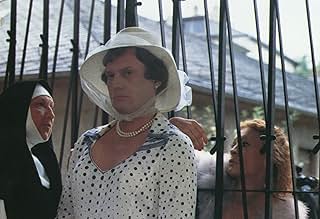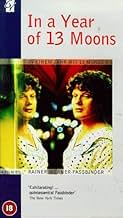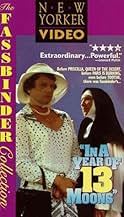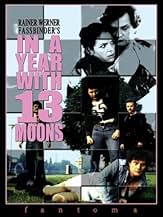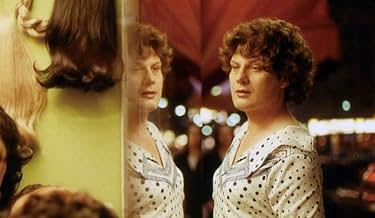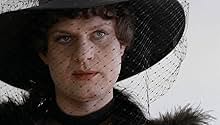VALUTAZIONE IMDb
7,3/10
5032
LA TUA VALUTAZIONE
Una donna transgender cerca di salvare qualcosa dalla sua vita confrontandosi con il suo passato angoscioso, sperando di trovare la massima accettazione tra i suoi conoscenti e se stessa.Una donna transgender cerca di salvare qualcosa dalla sua vita confrontandosi con il suo passato angoscioso, sperando di trovare la massima accettazione tra i suoi conoscenti e se stessa.Una donna transgender cerca di salvare qualcosa dalla sua vita confrontandosi con il suo passato angoscioso, sperando di trovare la massima accettazione tra i suoi conoscenti e se stessa.
- Regia
- Sceneggiatura
- Star
- Premi
- 1 vittoria in totale
Lilo Pempeit
- Schwester Gudrun
- (as Lieselotte Pempeit)
Janez Bermez
- Oskar Pleitgen
- (non citato nei titoli originali)
Rainer Werner Fassbinder
- Self
- (filmato d'archivio)
- (non citato nei titoli originali)
Günther Holzapfel
- Angestellter H. H. Brei
- (non citato nei titoli originali)
Ursula Lillig
- Putzfrau
- (non citato nei titoli originali)
Augusto Pinochet
- Self
- (filmato d'archivio)
- (non citato nei titoli originali)
Recensioni in evidenza
"In a Year of 13 Moons" is a harrowing and brutal film that explores the themes of identity, human suffering and despair. Fassbinder's films, for the most part, are penetrating glimpses into the human condition at its most vulnerable. I really adore Ingmar Bergman's films, but they are considered "too pessimistic or depressing" for some, but my goodness, Rainer Werner Fassbinder's are bleak as night, often set in an unforgiving, cold and unreceptive world.
The film follows Elvira Weishaupt (Volker Spengler), a troubled and struggling transgender woman, who is wrestling with her identity. Fassbinder would construct the film through a non-linear narrative, that intertwines her many painful memories, her personal encounters, and the many philosophical thoughts and reflections on her life. Considered by many to be one of Fassbinder's most challenging and deeply personal films, and for good reason too. Fassbinder would make "In a Year of 13 Moons" in response to the suicide of his close lover, and this grief added to the intense and turbulent atmosphere that the film carries. The themes of rejection and despair are strong themes that drive the film, along with the search for love, and the pain and devastation of its absence. One of my favorite directors, Richard Linklater, would regard it as his favorite Fassbinder film. It is claustrophobic and very depressing, but for people who enjoy character driven dramas, then you may appreciate it.
The film follows Elvira Weishaupt (Volker Spengler), a troubled and struggling transgender woman, who is wrestling with her identity. Fassbinder would construct the film through a non-linear narrative, that intertwines her many painful memories, her personal encounters, and the many philosophical thoughts and reflections on her life. Considered by many to be one of Fassbinder's most challenging and deeply personal films, and for good reason too. Fassbinder would make "In a Year of 13 Moons" in response to the suicide of his close lover, and this grief added to the intense and turbulent atmosphere that the film carries. The themes of rejection and despair are strong themes that drive the film, along with the search for love, and the pain and devastation of its absence. One of my favorite directors, Richard Linklater, would regard it as his favorite Fassbinder film. It is claustrophobic and very depressing, but for people who enjoy character driven dramas, then you may appreciate it.
In A Year With 13 Moons was directed rather late in director Werner Rainer Fassbinder's career, and in this film you almost get a whiff of life imitating art as you feel like you're watching the last days of Fassbinder as a director. In this film you can see the influence of films that Fassbinder admired, for example, Le Diable probablement, but In A Year With 13 Moons is bleak and impersonal in a way that the aforementioned film is not. It lacks the aesthetic obsession that French films often have and instead there is an emphasis on showing people and places as they truly are.
There are scenes that take place in darkened rooms where you almost get a contrived, science-fiction feel, and you're reminded that in all fiction the process of "world-building" occurs, but it's less obvious in contemporary drama because the viewer/reader is able to associate the names of places and people in the drama with real places and people, so the contrived nature and world-building are neatly tucked under the rug for no one to see. The film is remarkable in its tale of Elvira/Erwin who breaks up with her lover and then has to meet up with an old acquaintance after a misunderstanding. The actors totally inhabit their roles as they generally do in Fassbinder's films and this certainly is a testament to Fassbinder's brilliance as a director.
The primary weakness of this film is that it lacks naturalness and feels just a little too false, in contrast to, for example, Fassbinder's Fox and His Friends, which feels very natural. In A Year With 13 Moons is artsier, somewhat commedia-dell'arte-esque with its stereotypical characters, but after watching so many bad films recently this particular film felt like a breath of fresh air. A notable scene occurs at a butcher site or mechanical abattoir where cattle are being bled and slaughtered, which again was a little reminiscent of the scenes of environmental degradation in Le Diable probablement. In A Year With 13 Moons is a must-see. 8 out of 10.
There are scenes that take place in darkened rooms where you almost get a contrived, science-fiction feel, and you're reminded that in all fiction the process of "world-building" occurs, but it's less obvious in contemporary drama because the viewer/reader is able to associate the names of places and people in the drama with real places and people, so the contrived nature and world-building are neatly tucked under the rug for no one to see. The film is remarkable in its tale of Elvira/Erwin who breaks up with her lover and then has to meet up with an old acquaintance after a misunderstanding. The actors totally inhabit their roles as they generally do in Fassbinder's films and this certainly is a testament to Fassbinder's brilliance as a director.
The primary weakness of this film is that it lacks naturalness and feels just a little too false, in contrast to, for example, Fassbinder's Fox and His Friends, which feels very natural. In A Year With 13 Moons is artsier, somewhat commedia-dell'arte-esque with its stereotypical characters, but after watching so many bad films recently this particular film felt like a breath of fresh air. A notable scene occurs at a butcher site or mechanical abattoir where cattle are being bled and slaughtered, which again was a little reminiscent of the scenes of environmental degradation in Le Diable probablement. In A Year With 13 Moons is a must-see. 8 out of 10.
As some others have written or implied this film is absolutely exhausting. It doesn't abandon its character or his life at any time although at times we almost WANT relief. Mahler's music in films has been dutifully noted. It can be almost as depressing in concert version. As for Nino Rota's "happy" music, or "life just continues (joyfully)" score, the irony isn't lost either. This is a one-man job and therefore takes risks that few producers or companies would tolerate under normal circumstances. I was profoundly moved by the film; I just don't plan to see it again for a while.
Curtis Stotlar
Curtis Stotlar
This drama follows the last few days in the life of Elvira (formerly Erwin) Weisshaupt. Years before, Erwin told a co-worker, Anton, that he loved him. "Too bad, you aren't a woman," he replied. Erwin took Anton at his word. Trying to salvage something from the wreckage love has made of his life, he now hopes that Anton will not reject him again.
At this point (2017), I have seen most of what Fassbinder has made. And, indeed, the vast majority is really good. Some have said this is his best work. While I am not sure I am ready to jump on that train, I am also not willing to deny the possibility. Even the content alone deserves praise. This is 1978. I am no expert on transgender history, but I cannot think of any films that tackled such a heavy subject this far back.
If anything, the film seems even more topical today as transgender issues are more front and center. The mainstream is ready to stand up for the rights of these folks, and films like "13 Moons" should really be re-examined by the film community.
At this point (2017), I have seen most of what Fassbinder has made. And, indeed, the vast majority is really good. Some have said this is his best work. While I am not sure I am ready to jump on that train, I am also not willing to deny the possibility. Even the content alone deserves praise. This is 1978. I am no expert on transgender history, but I cannot think of any films that tackled such a heavy subject this far back.
If anything, the film seems even more topical today as transgender issues are more front and center. The mainstream is ready to stand up for the rights of these folks, and films like "13 Moons" should really be re-examined by the film community.
Many, if not all of Fassbinder's films focus on weighty, emotional issues and characters plunged into personal despair, but none more so than the torturous and overpowering melodrama of In a Year of 13 Moons (1978). Here, Fassbinder created a film that is completely miserable in both tone and content from the first frame until the last; with the director taking the personal loss over the suicide of his lover Armin Meier and turning it into a suffocating chamber piece of pain and humiliation. Like his earlier masterpiece, Fox and his Friends (1975), the film focuses on the personal exploitation and persecution of a sensitive character at the hands of the people that he loves, as he finds himself cast against a cruel backdrop of the grimy and oppressive homosexual sub-culture of 1970's Frankfurt. However, unlike Fox and his Friends, the spirit of Meier's death and the guilt that we assume Fassbinder was suffering from at the time of the film's conception have here removed any prevailing notion of hope or the promise of escape that hung-over the character of Franz - the lottery winning carnival worker from the aforementioned "Fox", as he sought an end to his cruel suffering - and replaced it with a continually degrading emphasis on shame and deprivation.
Fassbinder establishes the pitiless tone of the film right from the start, with an opening vignette showing our central character, dowdy transsexual Elvira Weishaupt, dressed as a man and wandering through a park in the early hours of the morning looking for trade. After successfully managing to hook-up with a suitably butch male-prostitute, her secret is soon discovered and the 'john', alongside a couple of similarly macho friends, beat and mock Elvira, leaving her as a shivering, crying wreck, half-naked on an disused train-track. From here, Elvira limps home to her cramped apartment only to be plunged into a torturous, violent argument with her ex-boyfriend, which again, leaves her used and humiliated. The film continues in this episodic approach as we follow Elvira over the course of a few days and eventually find out more about her true character and personality and the events in her life that led to the eventual creation of the person that she is when we first discover her. These events are no less cruel and humiliating to the character of Elvira - who has clearly made a number of mistakes, either as a result of naiveté, arrogance or blind stupidity - as we discover the process that turned a handsome young man with a wife and infant daughter into an overweight, alcoholic wreck, abused and betrayed by the various men in her life, and the social pariahs that hang on the periphery.
As ever with Fassbinder, the presentation of the film underpins the feelings of the character and the world that she inhabits perfectly; with the cramped spaces of her apartment made even more prison-like and oppressive by the director's claustrophobic use of staging, design and composition. Fassbinder undertook the role of cinematographer himself here and shot the film on grainy 16mm, which again, adds to the stark and colourless feeling that the film conveys. The ugliness of the cinematography, with its dimly lit rooms, fragment composition and awkward camera movements could be seen as either amateurish on the part of the filmmaker, or as a deliberate attempt to distance the viewer from the characters and the emotional subtext in a manner that is reminiscent of Brecht; or, more appropriately, Godard's cinematic appropriation of Brecht and his theatre of alienation. As with the subsequent political satire, The Third Generation (1979) - once again, shot by Fassbinder himself - the unconventional approach to cinematography is combined with further elements that attempt to similarly disarm us and make the process of viewing the film as difficult as possible. The opening scene itself is emblematic of this approach, with Fassbinder obscuring the frame with large titles and an opening text that scrolls slowly over the entire frame before continuing with his use of obscured images and fragmented mise-en-scene.
Fassbinder also uses jarring cuts, with scenes seemingly beginning during the middle of a conversation or after the context of the scene has already been established, whilst sound and the disorientating way in which the director has characters talking over one another while music plays disconcertingly in the background all continue this idea of deconstruction and emotional distraction. The ugliness of the film fits perfectly with its tone; with the legendary scene in which Elvira and her friend wander ghost-like through an actual slaughterhouse, where cows are dispatched in graphic detail, whilst a monologue is recited to give us the entire back-story of this truly tragic figure. Whether or not Elvira is an extension of Fassbinder or the personification of Armin Meier is unknown, though there is certainly that element to the interpretation. I'd imagine that there is also some of the director in the portrayal of manipulative antagonist Anton Saitz, who recalls the depiction of Fassbinder in the director's own segment of Germany in Autumn (1978). Regardless, In a Year of 13 Moons is a fascinating if entirely difficult work from Fassbinder; one that brims with an uncomfortable feeling of personal confession and searing self examination that is grotesque, repellent and utterly draining, whilst also standing as a powerful and passionately realised piece of work that is both remarkable and affecting.
Fassbinder establishes the pitiless tone of the film right from the start, with an opening vignette showing our central character, dowdy transsexual Elvira Weishaupt, dressed as a man and wandering through a park in the early hours of the morning looking for trade. After successfully managing to hook-up with a suitably butch male-prostitute, her secret is soon discovered and the 'john', alongside a couple of similarly macho friends, beat and mock Elvira, leaving her as a shivering, crying wreck, half-naked on an disused train-track. From here, Elvira limps home to her cramped apartment only to be plunged into a torturous, violent argument with her ex-boyfriend, which again, leaves her used and humiliated. The film continues in this episodic approach as we follow Elvira over the course of a few days and eventually find out more about her true character and personality and the events in her life that led to the eventual creation of the person that she is when we first discover her. These events are no less cruel and humiliating to the character of Elvira - who has clearly made a number of mistakes, either as a result of naiveté, arrogance or blind stupidity - as we discover the process that turned a handsome young man with a wife and infant daughter into an overweight, alcoholic wreck, abused and betrayed by the various men in her life, and the social pariahs that hang on the periphery.
As ever with Fassbinder, the presentation of the film underpins the feelings of the character and the world that she inhabits perfectly; with the cramped spaces of her apartment made even more prison-like and oppressive by the director's claustrophobic use of staging, design and composition. Fassbinder undertook the role of cinematographer himself here and shot the film on grainy 16mm, which again, adds to the stark and colourless feeling that the film conveys. The ugliness of the cinematography, with its dimly lit rooms, fragment composition and awkward camera movements could be seen as either amateurish on the part of the filmmaker, or as a deliberate attempt to distance the viewer from the characters and the emotional subtext in a manner that is reminiscent of Brecht; or, more appropriately, Godard's cinematic appropriation of Brecht and his theatre of alienation. As with the subsequent political satire, The Third Generation (1979) - once again, shot by Fassbinder himself - the unconventional approach to cinematography is combined with further elements that attempt to similarly disarm us and make the process of viewing the film as difficult as possible. The opening scene itself is emblematic of this approach, with Fassbinder obscuring the frame with large titles and an opening text that scrolls slowly over the entire frame before continuing with his use of obscured images and fragmented mise-en-scene.
Fassbinder also uses jarring cuts, with scenes seemingly beginning during the middle of a conversation or after the context of the scene has already been established, whilst sound and the disorientating way in which the director has characters talking over one another while music plays disconcertingly in the background all continue this idea of deconstruction and emotional distraction. The ugliness of the film fits perfectly with its tone; with the legendary scene in which Elvira and her friend wander ghost-like through an actual slaughterhouse, where cows are dispatched in graphic detail, whilst a monologue is recited to give us the entire back-story of this truly tragic figure. Whether or not Elvira is an extension of Fassbinder or the personification of Armin Meier is unknown, though there is certainly that element to the interpretation. I'd imagine that there is also some of the director in the portrayal of manipulative antagonist Anton Saitz, who recalls the depiction of Fassbinder in the director's own segment of Germany in Autumn (1978). Regardless, In a Year of 13 Moons is a fascinating if entirely difficult work from Fassbinder; one that brims with an uncomfortable feeling of personal confession and searing self examination that is grotesque, repellent and utterly draining, whilst also standing as a powerful and passionately realised piece of work that is both remarkable and affecting.
Lo sapevi?
- QuizThe tape-recorded narration heard throughout the film (particularly during the final scene) was not scripted. Volker Spengler (playing Elvira Weishaupt) and Rainer Werner Fassbinder recorded the narration together, with Fassbinder asking questions and Spengler responding in character. In the final cut of the film, Fassbinder's voice is edited out.
- Colonne sonoreSchöner fremder Mann
Music and Words by Athena Hosey and Hal Gordon and German lyrics by Camillo Felgen
Performed by Connie Francis
I più visti
Accedi per valutare e creare un elenco di titoli salvati per ottenere consigli personalizzati
- How long is In a Year with 13 Moons?Powered by Alexa
Dettagli
- Data di uscita
- Paese di origine
- Lingua
- Celebre anche come
- Un anno con tredici lune
- Luoghi delle riprese
- Aziende produttrici
- Vedi altri crediti dell’azienda su IMDbPro
Botteghino
- Budget
- 700.000 DEM (previsto)
- Tempo di esecuzione2 ore 4 minuti
- Mix di suoni
- Proporzioni
- 1.66 : 1
Contribuisci a questa pagina
Suggerisci una modifica o aggiungi i contenuti mancanti

Divario superiore
By what name was Un anno con 13 lune (1978) officially released in India in English?
Rispondi
